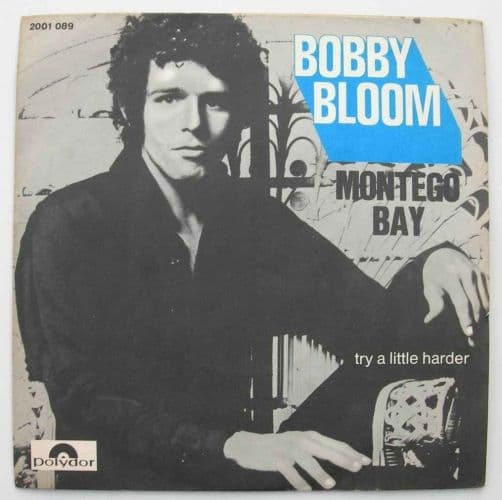
A Calypso-Pop Anthem Offering a Sweet, Sun-Drenched Escape from the Tumult of 1970.
Oh, the summer of 1970. It was a time of immense cultural upheaval, the Vietnam War was dragging on, and the sweet, innocent sounds of the ’60s were rapidly giving way to harder rock and political commentary. But then, from seemingly out of nowhere, arrived a two-minute and fifty-three-second piece of pure, blissful escapism: “Montego Bay” by the Brooklyn-born singer-songwriter Bobby Bloom. It was a sun-drenched, calypso-flavored invitation to a Jamaican paradise, delivered with such infectious cheer that it was impossible to resist, becoming one of the era’s quintessential “one-hit wonders,” a term that hardly does justice to its immediate impact and lingering charm.
The song hit the charts in the Fall of 1970 and became a transatlantic smash. In the US, it peaked at No. 8 on the Billboard Hot 100, while across the pond, it soared even higher, reaching an impressive No. 3 on the UK Singles Chart. It was a top-ten presence in Canada (No. 5) and Australia (No. 7) as well, cementing its status as a global phenomenon and the undisputed centerpiece of The Bobby Bloom Album. It’s remarkable to think of this light, bubblegum-pop confection—co-written and produced by the legendary hitmaker Jeff Barry—managing to find such a significant foothold amidst the musical giants of the day.
The story behind “Montego Bay” is perhaps as bittersweet as the song is sweet. The biggest surprise is that when Bloom recorded the song, he reportedly had never actually been to Montego Bay, the capital of St. James Parish in Jamaica. Instead, he and Jeff Barry concocted this musical vacation fantasy, a testament to the power of imagination and the universal longing for paradise. The lyrics paint a vivid picture of arrival and relaxation: “Vernon’ll meet me when the BOAC lands / Keys to the M.G. will be in his hands,” immediately transporting the listener from their everyday life to the island where the “driving and it’s on the right side.” The song is an ode to simple pleasures: lying on a lilo until you’re “lobster red,” the cool silver rum, and the desire to “thirst to be thirsty.” The joyous whistling and the use of calypso rhythms and Jamaican instruments perfectly capture the island atmosphere, even for a singer who hailed from the concrete jungle of New York.
The true meaning of “Montego Bay” lies in its role as a perfect fantasy machine. It wasn’t about deep political commentary or complex emotional narratives; it was a simple, heartfelt desire for a carefree life, a three-minute trip to paradise for anyone feeling the weight of the world. Yet, the song carries a profound layer of poignancy, especially in hindsight. Bobby Bloom’s life was tragically cut short just four years later, in 1974, at the age of 28, dying from a gunshot wound in circumstances that remain shrouded in some debate (some accounts point to an accidental self-inflicted wound while cleaning a gun, others to a fight). This tragic end lends a heartbreaking, almost haunting, quality to his song of perpetual sunshine and joy.
For those of us who remember turning up the radio in 1970, “Montego Bay” remains a golden memory, a fleeting, sun-drenched postcard from a time that felt simpler—at least for the duration of the track. It’s a reminder of the sheer delight that can be found in a well-crafted pop song, a moment of pure, unadulterated musical happiness that still has the power to carry you away. The song even has a curious, almost mythical final touch: on the master tape (though often omitted from the single version), Bloom spontaneously breaks into a line from Rodgers and Hammerstein’s “Oh, What a Beautiful Mornin’,” a final, exuberant flourish that perfectly captures the song’s spirit of optimism.